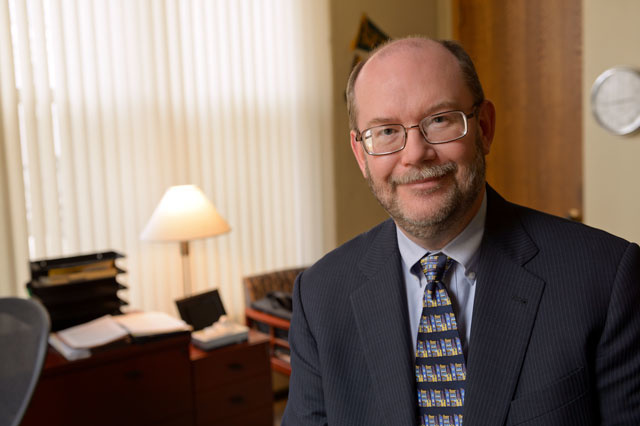The University of Iowa’s vice president for research and economic development will urge congressional lawmakers to support exascale computing, the next generation of supercomputers designed to tackle complex societal questions, from climate change to the human mind.
Daniel Reed will appear at a hearing on Wednesday, May 22, of the House Subcommittee on Energy, titled, “America’s Next Generation Supercomputer: The Exascale Challenge.” The hearing begins at 10 a.m. in Room 2318 of the Rayburn House Office Building in Washington. It will be webcast live.

Reed has been actively involved in advanced computing for nearly 30 years, leading the National Science Foundation’s National Center for Supercomputing Applications at the University of Illinois, the Renaissance Computing Institute in the Research Triangle in North Carolina as well as being the chief architect for the NSF TeraGrid. Before coming to Iowa last fall, Reed was an executive at Microsoft Corp., helping shape the company’s vision for technology innovations in parallel and cloud computing and its engagement with governments and institutions worldwide.
In his remarks, Reed will note the United States remains the leader in high-performance computing, occupying first, second, and fourth on the list of the world’s fastest supercomputers. Yet, he will warn the nation’s superiority is eroding, and will be jeopardized if partnerships among governmental agencies, with industry as well as adequate funding are not pursued.
“U.S. consumers and businesses are an increasingly small minority of the global market for mobile devices and cloud services,” Reed will say in his remarks. “We live in a ‘post-PC’ world where U.S. companies compete in a global device ecosystem. Unless we are vigilant, these economic and technical changes could further shift the center of enabling technology R&D away from the U.S.”
He continues, “A vibrant U.S. ecosystem of people and technical innovation is the true lifeblood of sustainable exascale computing.”
Exascale computing revolves around building the next generation of a supercomputer capable of performing a million trillion calculations. The U.S., China, Europe, and Japan are all vying to build an exascale computer by 2020, although that goal has been thrown into some doubt by barriers, such as in chip design and the energy needed to power such massive systems. Still, the benefits to society, health, and innovation are considered to far outweigh the challenges.
In addition to being the vice president for research and economic development at the UI, Reed is university chair in computational science and bioinformatics and professor of computer science, electrical and computer engineering, and medicine.
Joining Reed at the hearing will be Roscoe Giles, chairman, Advanced Scientific Computing Advisory Committee, which produced a report for the Department of Energy in 2010 examining the opportunities and challenges of exascale computing; Rick Stevens, associate laboratory director for computing, environment and life sciences at Argonne National Laboratory; and Dona Crawford, associate director for computation at Lawrence Livermore National Laboratory.
The subcommittee’s chair is Rep. Cynthia Lummis, Republican from Wyoming. The panel is part of the House Committee on Science, Space and Technology, chaired by Rep. Lamar Smith, Republican from Texas.